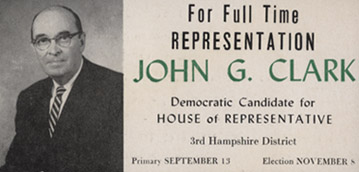Background on John G. Clark

John G. Clark's colorful life began on February 26, 1902 in Northampton, Massachusetts. His wife, Ruth Miller Clark was born in 1902 in Easthampton; like her husband, she was raised in Western Massachusetts. John and Ruth married just as the Great Depression commenced; their only child- a son- John P. Clark was born in 1930. During the early Depression years, Clark worked in his insurance business and attended law school at night, but this small family- like so many others- faced economic hardships, which led to John losing his business.
World War II saw the Clark's through many changes; the most significant being the purchase of the dairy farm at 79 Holyoke Street in 1940. While running the farm, both John and Ruth spent some time working at the Springfield Armory during the war, which served as their contribution to the war effort. Their main focus, however, was always the dairy farm; Ruth kept all of the financial records along with every inventory needed. Together, John and Ruth worked seamlessly to run the farm while raising their son.
Their only child, John P. Clark (fondly referred to as "Jack Jr.") was the recipient of all their love and support. Great attention was paid to his education, evidenced by the report cards, letters, speeches, and school programs that they preserved. As a young boy, Jack Jr. attended Easthampton elementary school and Easthampton High School before finishing out his secondary education at Williston Academy between 1947 and 1949. He went on to serve in the Korean War as part of the United States Air Force, and spent time on different bases in Texas and California in addition to serving overseas in Okinawa, Japan. Throughout 1954-55 Jack Jr. remained in close contact with his parents; a large amount of correspondence relating the goings-on in the affair force and at home in Easthampton has been preserved.
While Jack Jr. served in the Air Force, life in Easthampton underwent changes. The dairy farm needed to be closed down after the herd became infected with disease. After this, John worked as a milkman for H.P. Hood & Sons Milk Company; series three of this collection houses a photograph of a group of milkmen. Series two features some letters from this company; one in particular that congratulates Mr. Clark on being the "top wholesale salesman on Egg Nogg sales" in his branch. Meanwhile, Ruth went back to office work at the Springfield Armory. Though they were busy, John and Ruth always had Jack on their minds while he remained overseas.
John's political career began in 1960 when he ran for, and was elected to the Massachusetts State House of Representatives, representing the third Hampshire County District. He ran on the platform of providing full representation for his constituents; meaning that he would make himself available to the public and assist them in any way in which he was able. He continued this idea throughout his three terms. One of the ways he provided this -- full representation -- included having office hours from nine in the morning to twelve in the afternoon on three Saturdays a month; each Saturday was spent in one of the three towns where he had office located. His dedication also shown through in his correspondence with a few local young men serving in Vietnam in 1966. The letters offered words of encouragement in between relating some of the goings-on back home. Series one also contains a separate folder holding a huge amount of correspondence between Clark and his constituents. People wrote and asked for his help, or brought a town issue to his attention. Either John or Ruth would try to respond to each constituent. During his three terms, Ruth worked tirelessly as his secretary; answering and returning calls, typing his correspondence and keeping his records in order. Together, these two people formed one of the hardest-working teams.
During his time in office, John formed a close friendship with Lorenzo Jeffers, the chief of the Wampanoag Tribe. When John first went to the legislature, he heard a speech by a member of this tribe and that moment sparked his interest in helping the tribe in any way possible; he worked ardently for the tribe to gain the land necessary to build the Gay Head Museum in Gay Head, MA on Martha's Vineyard. John was even inducted into the Wampanoag Tribe as a honorary chief. Clark remained friends with Jeffers, even after his last term in office.
John choose not to run for reelection in 1968, and instead moved on to serve as the clerk of the Hampshire County district court. He enjoyed his time in that position because of his keen interest in the law. Unfortunately, in December of 1968, Clark suffered a stroke which ended his job at the court; he was never able to return to work. During his rehabilitation he documented the stroke and his recovery through letters and journal-esque pieces, which can be found in series two of this collection. He refused to remain on the sidelines, and used this writing time to regain use of his hands.
John G. Clark passed away in May 1972 at age 70. He left behind a legacy of full representation for his constituents, and is remembered as being a representative whom the people knew they could always count on.

